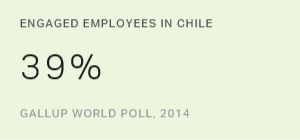Story Highlights
- Chile's overreliance on natural resources puts country at economic risk
- OECD advises a more systematic investment in human capital
- Chile has one of the most engaged workforces in Latin America
With China's sluggish economy taking most of its Latin American trade partners down with it, nearly every major economy in the region -- including its wealthiest, Chile -- is either slowing down or shrinking. This downward spiral effectively signals the end of Latin America's recent economic boom.
Cycles of boom and bust like the last one are hardly a new phenomenon in Latin American economics. In fact, they were a defining feature of the region's economic history through much of the 20th century. However, the protracted overreliance on the international price of commodities and raw materials that has perpetuated these cycles is a key barrier to real, sustainable growth in Latin America in the 21st century and beyond. All countries in the region desperately need new ways to increase their productivity.
Chile is no exception. Like most countries in the region, Chile has vast reserves of natural resources, and despite its attempts to diversify its economy, its continued dependence on them has kept the country vulnerable to fluctuations in the global economy. The price of copper, Chile's main export, has plummeted in the past several years as demand from the world's biggest consumer of the metal, China, has dropped. As a result, Chile's growth in 2014 was its slowest in five years, and the country has struggled to rebound since, as investment stagnates and consumer spending remains weak.
However, Chile may be better positioned than most countries in Latin America to endure this economic downturn. Not only has the country benefited from strong institutional stability in recent decades, it has also forged important trade alliances with much of the world, and is arguably one of the region's most open and investment-friendly economies.
But some of Chile's best opportunities to boost productivity may lie in accumulating human capital and maximizing the talents and skills of its existing workforce -- which the Organization for Economic Cooperation and Development (OECD) identifies as major obstacles to improving productivity at Chilean firms. In fact, the OECD advises that more systematic investment in the development of Chile's human capital is definitely in order. In this regard, Chile has strong foundations that it can build on.
Access to education in the country is already broader and better than the average in Latin America, which is a decided plus as Chile seeks to improve its human capital. However, Chile's educational system still needs more investment. Chile's workplaces continue to lack sufficient quantities of well-trained workers with higher education, which is exactly the type of advanced human capital that these businesses rely on for innovation and research and development. Chileans themselves likely see the need for such investment; Gallup surveys in 2014 showed the majority (51%) of residents are dissatisfied with the educational system or the schools in their communities.

One of the Most Engaged Workforces in the Region
Chile also stands to benefit from having one of the most engaged workforces in Latin America, according to Gallup's studies of workers in the region and around the world. Based on people's answers to questions that -- according to 30 years of Gallup research -- best predict employee and workgroup performance, Gallup categorizes workers as engaged, not engaged or actively disengaged. Nearly four in 10 employed Chileans (39%) are engaged at work, easily outdistancing the regional average (29%).
| % Engaged | |||||||||||||||||||||||||||||||||||||||||||||||||||||||||||||||||||||||||||||||||||||||||||||||||||
|---|---|---|---|---|---|---|---|---|---|---|---|---|---|---|---|---|---|---|---|---|---|---|---|---|---|---|---|---|---|---|---|---|---|---|---|---|---|---|---|---|---|---|---|---|---|---|---|---|---|---|---|---|---|---|---|---|---|---|---|---|---|---|---|---|---|---|---|---|---|---|---|---|---|---|---|---|---|---|---|---|---|---|---|---|---|---|---|---|---|---|---|---|---|---|---|---|---|---|---|
| Latin America & the Caribbean | 29% | ||||||||||||||||||||||||||||||||||||||||||||||||||||||||||||||||||||||||||||||||||||||||||||||||||
| Belize | 42% | ||||||||||||||||||||||||||||||||||||||||||||||||||||||||||||||||||||||||||||||||||||||||||||||||||
| Panama | 41% | ||||||||||||||||||||||||||||||||||||||||||||||||||||||||||||||||||||||||||||||||||||||||||||||||||
| Chile | 39% | ||||||||||||||||||||||||||||||||||||||||||||||||||||||||||||||||||||||||||||||||||||||||||||||||||
| Jamaica | 36% | ||||||||||||||||||||||||||||||||||||||||||||||||||||||||||||||||||||||||||||||||||||||||||||||||||
| Colombia | 35% | ||||||||||||||||||||||||||||||||||||||||||||||||||||||||||||||||||||||||||||||||||||||||||||||||||
| Costa Rica | 35% | ||||||||||||||||||||||||||||||||||||||||||||||||||||||||||||||||||||||||||||||||||||||||||||||||||
| Dominican Republic | 35% | ||||||||||||||||||||||||||||||||||||||||||||||||||||||||||||||||||||||||||||||||||||||||||||||||||
| Puerto Rico | 35% | ||||||||||||||||||||||||||||||||||||||||||||||||||||||||||||||||||||||||||||||||||||||||||||||||||
| Guatemala | 34% | ||||||||||||||||||||||||||||||||||||||||||||||||||||||||||||||||||||||||||||||||||||||||||||||||||
| Bolivia | 29% | ||||||||||||||||||||||||||||||||||||||||||||||||||||||||||||||||||||||||||||||||||||||||||||||||||
| Brazil | 29% | ||||||||||||||||||||||||||||||||||||||||||||||||||||||||||||||||||||||||||||||||||||||||||||||||||
| Mexico | 29% | ||||||||||||||||||||||||||||||||||||||||||||||||||||||||||||||||||||||||||||||||||||||||||||||||||
| Honduras | 28% | ||||||||||||||||||||||||||||||||||||||||||||||||||||||||||||||||||||||||||||||||||||||||||||||||||
| Ecuador | 27% | ||||||||||||||||||||||||||||||||||||||||||||||||||||||||||||||||||||||||||||||||||||||||||||||||||
| Uruguay | 27% | ||||||||||||||||||||||||||||||||||||||||||||||||||||||||||||||||||||||||||||||||||||||||||||||||||
| El Salvador | 24% | ||||||||||||||||||||||||||||||||||||||||||||||||||||||||||||||||||||||||||||||||||||||||||||||||||
| Argentina | 23% | ||||||||||||||||||||||||||||||||||||||||||||||||||||||||||||||||||||||||||||||||||||||||||||||||||
| Nicaragua | 23% | ||||||||||||||||||||||||||||||||||||||||||||||||||||||||||||||||||||||||||||||||||||||||||||||||||
| Peru | 23% | ||||||||||||||||||||||||||||||||||||||||||||||||||||||||||||||||||||||||||||||||||||||||||||||||||
| Venezuela | 17% | ||||||||||||||||||||||||||||||||||||||||||||||||||||||||||||||||||||||||||||||||||||||||||||||||||
| Paraguay | 14% | ||||||||||||||||||||||||||||||||||||||||||||||||||||||||||||||||||||||||||||||||||||||||||||||||||
| Gallup World Poll, 2014 | |||||||||||||||||||||||||||||||||||||||||||||||||||||||||||||||||||||||||||||||||||||||||||||||||||
Gallup's research finds that people who are engaged at work are more involved in and enthusiastic about their work. They are loyal and productive. Those who are not engaged may be satisfied with their workplaces, but they are not intellectually and emotionally connected to them. Workers who are actively disengaged are physically present but intellectually and emotionally disconnected. They are unhappy with their work, share their unhappiness with their colleagues and are likely to jeopardize the performance of their teams.
But more than that, workplace engagement is one of the most important predictors of organic enterprise growth. Gallup workplace engagement studies show that work units that score in the top half of their organization in employee engagement have nearly double the odds of success (based on a composite of financial, customer, retention, safety, quality, shrinkage and absenteeism metrics) compared with those in the bottom half.
Compared with bottom-quartile units in Gallup's employee engagement database, top-quartile units have:
- 10% higher customer loyalty/engagement
- 22% higher profitability
- 21% higher productivity
- 25% lower turnover for high-turnover companies (those with 60% or higher annualized turnover)
- 65% lower turnover for low-turnover companies (those with 40% or lower annualized turnover)
- 48% fewer safety incidents
- 28% less shrinkage
- 37% lower absenteeism
- 41% fewer patient safety incidents
- 41% fewer quality incidents/defects
Gallup's workplace engagement studies around the world show that engagement is not the norm in any country. In fact, only 13% of employed workers worldwide are engaged at work. Chile, although it is doing much better, is not an exception. Though nearly four in 10 employed Chileans are engaged at work, the majority of workers are not. About half (47%) are not engaged and another 14% are actively disengaged.
| Engaged | Not Engaged | Actively Disengaged | |||||||||||||||||||||||||||||||||||||||||||||||||||||||||||||||||||||||||||||||||||||||||||||||||
|---|---|---|---|---|---|---|---|---|---|---|---|---|---|---|---|---|---|---|---|---|---|---|---|---|---|---|---|---|---|---|---|---|---|---|---|---|---|---|---|---|---|---|---|---|---|---|---|---|---|---|---|---|---|---|---|---|---|---|---|---|---|---|---|---|---|---|---|---|---|---|---|---|---|---|---|---|---|---|---|---|---|---|---|---|---|---|---|---|---|---|---|---|---|---|---|---|---|---|---|
| Chile | 39% | 47% | 14% | ||||||||||||||||||||||||||||||||||||||||||||||||||||||||||||||||||||||||||||||||||||||||||||||||
| World | 13% | 63% | 24% | ||||||||||||||||||||||||||||||||||||||||||||||||||||||||||||||||||||||||||||||||||||||||||||||||
| Gallup World Poll | |||||||||||||||||||||||||||||||||||||||||||||||||||||||||||||||||||||||||||||||||||||||||||||||||||
Of all the OECD countries, Chile is the one where employees work the most hours but with less productivity, which suggests a leadership problem in making proper, efficient use of workers' talents and a failure to energize the workplace to innovate and produce more with less. The OECD actually acknowledges that weaknesses in management practices in Chile are limiting the ability of employers in Chile to efficiently use existing skills in the business sector.
Gallup's workplace engagement studies around the world show that engagement is not the norm in any country. Even in the U.S., which is arguably the most productive economy in the world, only about 30% of the workforce is engaged at work. However, Gallup has ample evidence that workplace engagement can be increased through a disciplined process that includes dialogue, team participation, psychological incentives and accountability.
Favorable Macroeconomic Environment
As Chile grapples with external economic forces that hinder its short-term prosperity, it is fitting that the country has untapped competitive advantages that leaders can control -- in both the public and private sectors. Chile approaches this new cycle of economic downturn armed with a relatively sizable reservoir of engaged workers -- a scarce commodity in the world, but one capable of turning economies around, one workplace at a time.
For a country that needs to elevate its game through higher productivity, having a workforce that is more engaged than its competitors' means its workers are not only more willing to put in discretionary effort to get things done, but are more emotionally invested in their jobs, bringing excitement and creativity to the workplace. Not only are they more willing to adapt to change when needed, but they also have more energy to bring about change itself. But this energy needs to be unleashed through great talent management at work, and cultivated through quality education in society at large if it is to become that engine of productivity that the country so greatly needs.
Chile has long had a favorable macroeconomic environment that has brought along foreign investment, governance and prosperity. Its openness to the global economy has also allowed it to forge partnerships with other countries, with which it has thriving trade relations and bilateral cooperation in several key areas for its development. But Chile has long overrelied on natural resources whose market dynamics it doesn't control. So, it is time for the country to leverage -- and further invest in -- a natural resource that its leadership can control, that is extremely hard for others to replicate, and that no external economic force can take away: its human capital, the emotional engagement that Chileans bring to work every day.
A version of this article originally appeared in Chile-Suiza: Oportunidades y Negocios, a special publication of the Chilean-Swiss Chamber of Commerce.
